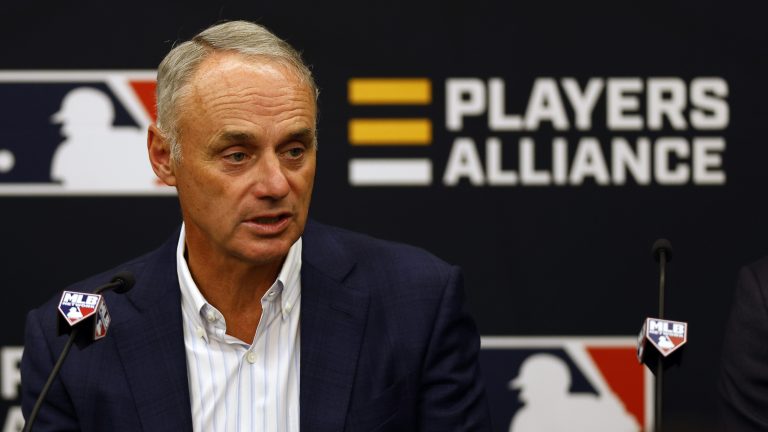MLB Owners Are Not Bargaining in Good Faith
As MLB's imminent work stoppage approaches, owners need to give up some ground to give up to avoid a strike.

Major League Commissioner Rob Manfred gave away the game plan in a public statement, which was part leverage and part strategy.
“An offseason lockout that moves the process forward is different than a labor dispute that costs games,” Manfred said.
Given the empty proposals from the MLB owners, which do nothing to address the legitimate concerns of the MLB Players Association, a lockout appears to be where we are headed.
As I have documented in a previous article on the CBA negotiations, MLB owners have spent the past decade taking advantage of a broken player compensation system. The owners’ share of revenues has been increasing, while the players have seen their overall revenues decline. This is mainly due to two factors.
The first is an arbitration system that allows teams to dramatically underpay their youngest players through the first three years of team control. The second is the tendency of rebuilding teams to avoid signing higher-price free agents for the sake of “tanking” for draft picks–an issue that is not unique to baseball. Closely linked to the second factor is the rise of analytics that pushes teams to substitute cheaper young players over more expensive free agent players by finding undervalued pieces.
Both parties understand these issues, but only the Players Association has advanced proposals designed to address them. The union wants arbitration shortened to two years instead of three, which would give younger players a better chance to have their salary match their value earlier in their careers. In addition, the union wants to change the draft allocation system to stop rewarding teams for tanking. Instead of giving the first pick of the draft to the team with the worst regular season record, MLB could adopt a lottery system similar to the NBA’s, but this seems like a long shot at the moment.
Third, the players want some assurances that revenues distributed to low-revenue or small market franchises are spent on the major league payroll. That could mean a salary floor or another type of incentive/monitoring system. Fourth, the players want an increase in the luxury tax threshold, currently $210 million, which the Players Association argues has been disincentivizing spending by high revenue teams.
The MLB owners appeared to address the issue of a salary floor in their first publicly leaked proposal, when they proposed a $100 million major league payroll minimum alongside a luxury tax threshold of $180 million. As I documented in a previous Just Baseball article, this was all smoke and mirrors.
The actual effect of this luxury tax threshold would be to put more money in the owners’ pockets and less in the players. By highlighting the aspect of the proposal that established a major league payroll minimum, the owners appeared to be deliberately jockeying for favorable public relations. After all, they would be perceived as addressing a major concern of the Players Association by requiring teams to spend more on their MLB payroll. On closer inspection, the lowering of the luxury tax threshold (by disincentivizing spending by high revenue teams) more than offset the requirement of a minimum payroll. The owners knew that the Players Association would reject this PR ploy, as it would continue the trend of more revenues going to the owners and less to the players.
The MLB Commissioner’s Office, serving as the owners’ voice in the ongoing negotiations, have continued to make proposals that are moving further away from the goals of the Players Association. Good faith bargaining means recognizing the ways that the sport’s financial system underpays players and trying to come up with solutions that address these problems. The owners are instead floating leaked proposals that do nothing to address the players’ concerns. Instead of shortening arbitration, the owners want to eliminate it entirely, replacing the arbitration process with a system that would link arbitration-eligible players salaries to a value calculation based on the WAR metric.
This might sound good at first glance, but notably absent from this proposal is any scaling of the WAR value calculation with the overall revenues of the sport. In other words, when overall revenues increase, the WAR valuation would remain the same, meaning that player salaries would not be adjusted to reflect more revenues that are coming into MLB.
The other MLB proposal reflects more duplicity: establishing age 29.5 as the cutoff point where players are eligible for free agency. This proposal would further depress the salaries of young MLB players, especially the young stars of the sport who arrive in the big leagues as early as age 20. These players would have to wait additional years to qualify for free agency.
With proposals like these being floated publicly, it seems likely that the owners are intent on locking out the players. Unless these are just “bargaining tactics,” which will shift as we get closer to the Dec. 1 deadline, the owners do not appear interested in even meeting the Players Association half-way in these negotiations, but instead are floating proposals that move further away from the players’ main objectives.
Of course, expect the predictable “pox on both your houses” rhetoric from the media and the fans, which is understandable, given the frustration people feel about the inability of billionaires to reach agreement with millionaires in a sport that continues to generate lucrative revenues. However, I would urge the media and fans to remember that these revenues are either going to the owners or the players, not to anyone else. And the owners appear intent on preserving and extending their revenue gains of the past decade. That attitude seems destined for a lockout and extended acrimony.

